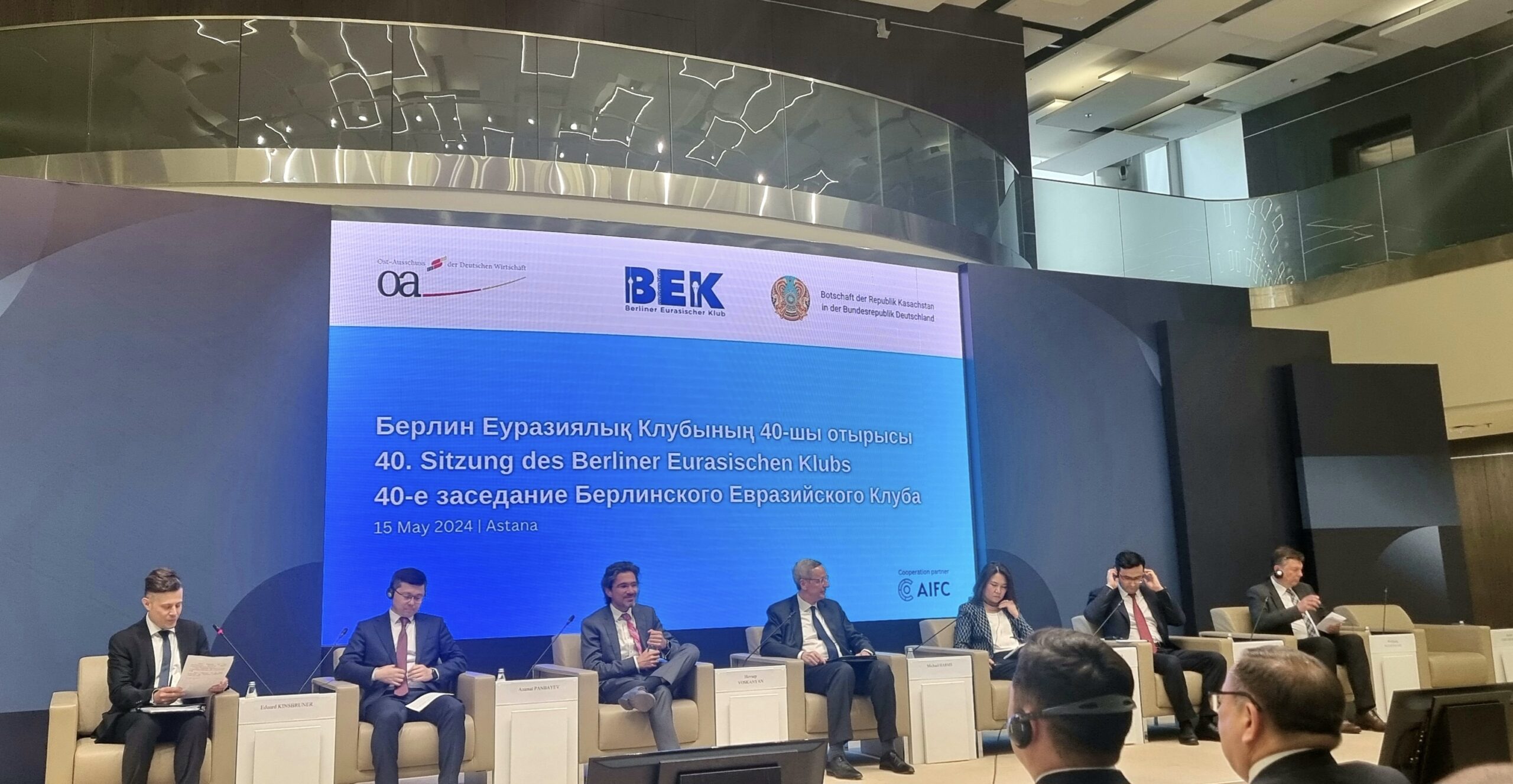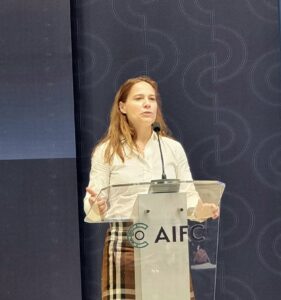ASTANA – The Kazakh capital hosted the 40th meeting of the Berlin Eurasian Club (BEC) focusing on enhancing investment attractiveness on May 15. The event brought together over 30 German and Kazakh companies from the energy, machinery, agricultural, and mining industries for comprehensive discussions covering various topics relevant to the countries’ raw materials, industrial, technological, and agro-industrial cooperation.

Astana hosted 40th meeting of the Berlin Eurasian Club on May 15. Photo credit: The Astana Times.
First Deputy Prime Minister Roman Sklyar said that mutual trade turnover between Kazakhstan and Germany grew by 41% last year, reaching nearly $4 billion.
He noted that this positive trend continued into the current year, with mutual trade volume increasing by another 34% in January and February.
Sklyar highlighted Kazakhstan’s inclusion in the list of 34 countries for which the Federal Government of Germany provides a preferential procedure for granting investment guarantees as a significant indicator of high political stability and investment security. Over the past few years, Kazakhstan has significantly improved its position as one of Germany’s top 50 leading foreign trade partners.
“Special prospects are opening up in investment cooperation, supported by new, high-quality projects with high added value. However, the potential of trade and economic cooperation is still not fully realized. The Kazakh government is ready to further develop mutually beneficial, multifaceted economic interaction with Germany,” he said.
Sklyar emphasized the role of the BEC as an important platform for expert dialogue on key issues of the bilateral agenda.
“We have established a tradition of holding regular meetings with our friends from the Eastern Committee of the German Economy in Kazakhstan, Germany, and the European Union to discuss priority areas of cooperation. Economic relations between our countries are developing successfully. Visits by Kazakhstan President Kassym-Jomart Tokayev to Germany and German President Frank-Walter Steinmeier to Kazakhstan last year boosted business cooperation. Intensive high-level exchanges reflect the desire for closer ties. It is important to continue active dialogue at all levels to further strengthen economic relations,” he said.

Cathrina Claas-Mühlhäuser, Chair of the Board of the Eastern Committee of the German Economy, highlighted crucial topics on the agenda, including resources and agriculture, significant to Germany and Kazakhstan. Photo credit: The Astana Times
Cathrina Claas-Mühlhäuser, the chair of the Board of the Eastern Committee of the German Economy echoed Sklyar’s view, noting that the BEC has brought together over 3,000 participants, making it an effective platform for bilateral cooperation.
She highlighted crucial topics on the agenda, including resources and agriculture, significant to Germany and Kazakhstan.
“Germany faces challenges in sourcing certain raw materials, and the recent aggression by Russia against Ukraine has exacerbated this dependence. Kazakhstan presents a promising partner to address this issue. Concrete projects and collaborations are essential, and I believe there is a strong willingness to cooperate,” she said.
Turning to agriculture, Claas-Mühlhäuser, with a background in agricultural machinery, emphasized the importance of the entire value chain.
“Kazakhstan is a significant producer of grain, boasting the finest wheat in the world. I support efforts to modernize the sector and explore opportunities in food processing and security, especially in light of recent geopolitical developments,” she added.
Vision for economic growth
Deputy Foreign Minister Nazira Nurbayeva stated that Kazakhstan aims to double its economy to $450 billion by 2029 and attract at least $150 billion in foreign investments.
“To achieve this, we need to create a favorable investment climate. Investments bring in technology, enhance labor productivity, and offer opportunities to diversify our economy, shifting from a targeted approach to one focused on creating added value within the country,” she said.
Nurbayeva discussed recent measures to protect and support foreign investors.
“The first measure is enhancing the Investment Promotion Council (Investment Headquarters) to eliminate bureaucratic barriers, addressing systemic issues and specific concerns. Over the past three months, more than 90 issues have been resolved through this platform,” she said.
The second measure includes creating a “green corridor” for large investors that establishes special conditions to expedite investment projects. Each company will receive dedicated support, including a manager to assist from start to finish.
“The third measure is the launch of a national digital investment platform, allowing government bodies and investors to track and monitor investment projects. The platform will help remove local barriers, ensuring transparency and prompt issue resolution,” she added.
Navigating challenges and exploring opportunities
Michael Harms, the executive director of the Eastern Committee of the German Economy expressed a desire to strengthen cooperation with Kazakhstan.
“Since 2012, we have had an agreement on cooperation in raw materials. However, progress has been slower than anticipated due to the significant time, funding, and risk involved. Projects can take 10 to 15 years to develop, making it challenging to predict market conditions,” said Harms.
According to him, the traditional model, where Kazakhstan invites companies to explore, invest, extract, process, and sell raw materials, is not effective. Instead, he believes a new approach could be successful.
“Kazakhstan has resources and partially produces them already. German companies seek secure supply chains and are interested in diversifying their sources for stability and reliability. Collaborating to create resilient and cost-effective supply chains could be a successful model,” he said.
Harms emphasized identifying where Germany’s significant needs for certain minerals align with Kazakhstan’s production capabilities.
“Using German technology to modernize production in Kazakhstan could be mutually beneficial. Working together on this scheme could be a significant step forward,” he added.
Hovsep Voskanyan, the head of the German Economic Representation in Central Asia, discussed the challenges and opportunities faced by both countries.
“German companies primarily want to purchase processed materials, such as aluminum wire, rather than raw ores, while Kazakhstan produces high-quality finished products. Transporting bulk raw materials from Kazakhstan to Germany is not economically viable, under current logistics conditions. Therefore, we must establish initial processing stages in Kazakhstan. This joint effort, including financing, is crucial for advancing our raw material cooperation,” he said.
Voskanyan urged the business and political sectors of both countries to support German-Kazakh mining projects more closely.
“These pilot projects can set the stage for broader cooperation and represent significant steps in our collaboration,” he said.
